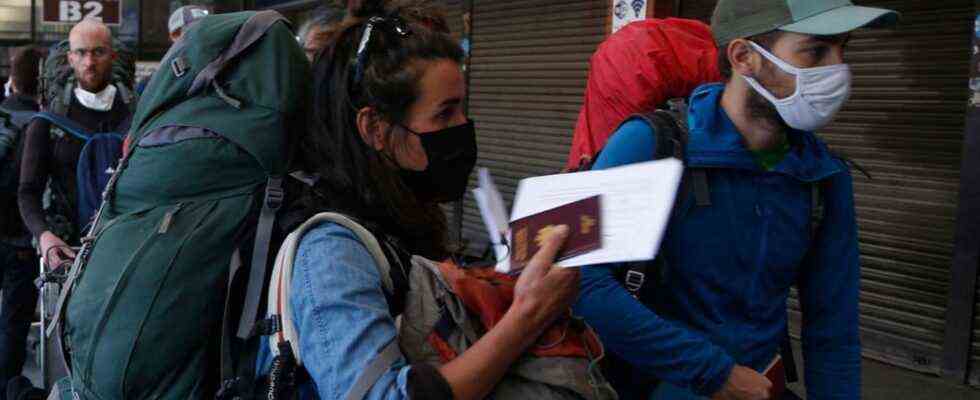Pandemic Airlift
One and a half years after the Corona return campaign: Around 7,000 invoices are still open
Tourists in Nepal are trying to get a place on a plane to travel to Germany again. In spring 2020, thousands of tourists were stranded around the world because of Corona.
© Niranjan Shrestha / AP / DPA
Because of Corona, thousands of tourists were stranded in spring 2020. The federal government started a return campaign. Each passenger was billed between 200 and 1000 euros. But some have not yet been settled.
Almost two years after the largest return campaign in the history of the Federal Republic at the beginning of the corona pandemic, thousands of bills are still open. Around 7,000 of the more than 54,000 payment notices sent by the Federal Foreign Office to the passengers on the 260 rescue flights have not yet been paid or not yet paid, as the German press agency learned from the ministry. For the most part, the payment deadline is still running or payment in installments has been agreed. In 1200 cases, however, the ministry had to initiate dunning proceedings. Many passengers argue against participation in the costs in court. Of the original 201 lawsuits, 135 are still pending.
The then Foreign Minister Heiko Maas (SPD) started the campaign on March 17, 2020 together with tour operators and airlines after many countries closed borders and cut flight connections at short notice. A total of about 240,000 travelers were returned. The tour operators themselves flew the tourists who had booked with them free of charge.
Total costs of 93.8 million euros
The Federal Foreign Office chartered planes for individual travelers and other people wishing to return, which made 260 flights and brought back around 67,000 people from around 65 countries by the end of April. From June onwards, the returnees were asked to pay. The total costs were then estimated at 93.8 million euros, almost 40 percent of which should be borne by the flight passengers themselves.
So far, 54,306 invoices for a total of 31.7 million euros have been sent in Germany. So far, 28.6 million euros have been received from this. Around 500 invoices to German citizens abroad still have to be sent.
The Federal Foreign Office is expecting four million euros from other countries to take their citizens with them. In addition, Germany received EU grants of 38.1 million. The bottom line is that the Federal Foreign Office assumes that it will get back 70 to 75 percent of the cost of the return campaign.
Corona “airlift” to the South Pacific
The ticket prices were roughly in the range of cheaper economy tickets for the respective regions. For flights from the Canary Islands and North Africa you have to pay 200 euros, for southern Africa and the Caribbean 500 euros, returnees from South America and Asia were billed 600 euros, and those who were brought back from New Zealand, Australia or a South Sea island received a payment notice for 1000 euros.
With long-distance flights in particular, this amount can only cover part of the total costs. The “airlift” – as Maas called the action – reached to the other end of the world. The most remote place from which Germans were brought back was the Cook Islands in the South Pacific – more than 16,000 kilometers away. From there, from Western Samoa and from the Pacific island states of Vanuatu and Tonga, 66 Germans and 34 citizens from other EU countries were picked up in a particularly costly individual action with two aircraft.
Summer vacation in Europe: what is possible – and what is not?
26 images
Berlin administrative court dismissed two lawsuits
A week before Christmas, the Berlin administrative court ruled in two individual cases that the passengers’ participation in the costs of the flights is lawful. The lawsuit of a family of six who was brought from Mexico and was supposed to pay 600 euros per person was heard. The Lufthansa charter flight with 282 passengers cost the Federal Foreign Office 612,000 euros, 2170 euros per passenger.
There was also a family of three who flew back from New Zealand and were supposed to pay 1000 euros per person. For the empty outbound flight and the return flight from New Zealand with 300 passengers, Lufthansa charged 995,000 euros, more than 3,300 euros per seat.
The judge said the government was legally entitled to bill some of the costs. The requested lump sums were “well below the actual costs”. The plaintiffs’ lawyers argued that some of the travelers had already booked cheaper return flights that were not reimbursed. In addition, the consular law, which the Federal Foreign Office invokes, applies to aid in the event of a disaster, but not to a pandemic.
The lawsuits are not yet final. A few more months should pass before the return campaign is completed.

